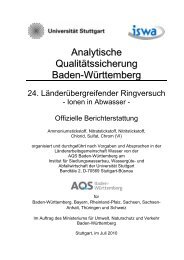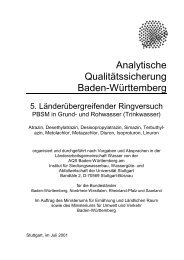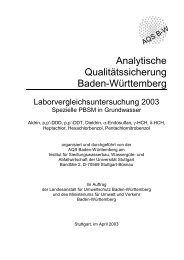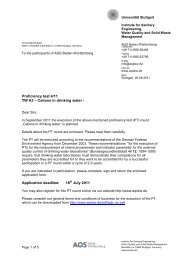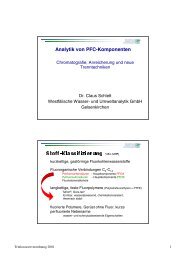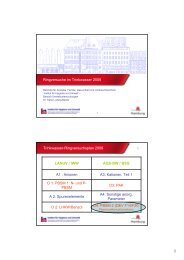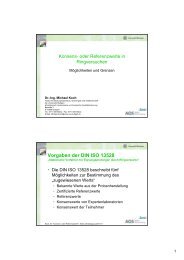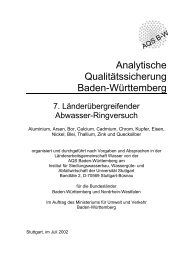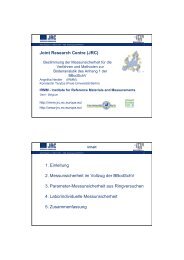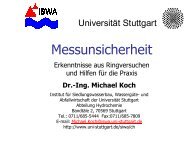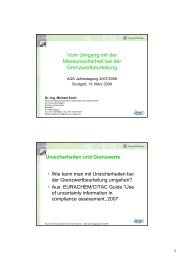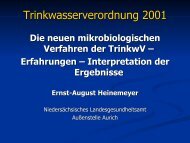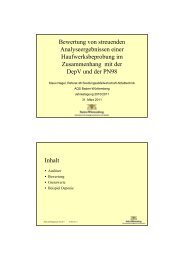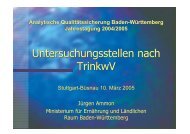Institute for Sanitary Engineering, Water Quality and Solid Waste ...
Institute for Sanitary Engineering, Water Quality and Solid Waste ...
Institute for Sanitary Engineering, Water Quality and Solid Waste ...
You also want an ePaper? Increase the reach of your titles
YUMPU automatically turns print PDFs into web optimized ePapers that Google loves.
Industrial <strong>Water</strong> <strong>and</strong> <strong>Waste</strong>water Technology IWT<br />
household waste is prohibited by law since 2005. The<br />
old l<strong>and</strong>fills still need a long <strong>and</strong> expensive maintenance<br />
up to 50 years. Nowadays waste incineration<br />
plants, composting plants, recycling facilities <strong>and</strong> mechanical-biological<br />
waste treatment (MBT) plants are<br />
state of the art.<br />
The big advantage of MBT plants is the low energy<br />
consumption <strong>for</strong> the operation, low emissions of green<br />
house gases <strong>and</strong> a high energy recovery. Even the invest<br />
costs are relatively low, compared the waste incineration<br />
plants. Also the rate of return is very high,<br />
as MBT plant can produce valuable refuse derived fuel<br />
(RDF) <strong>and</strong> biogas. The biogas can be used to produce<br />
electrical energy <strong>and</strong> heat by using combined heat <strong>and</strong><br />
power plant (CHP) or modern gas turbines.<br />
As boundary conditions differs from country to country<br />
<strong>and</strong> especially between developed <strong>and</strong> developing/<br />
newly industrialized countries the in Germany well approved<br />
MBT technology can not be used <strong>for</strong> waste of<br />
other countries one-to-one. One of the biggest differences<br />
in the waste composition is the higher organic<br />
as well as the higher water content. Beside that the<br />
climate <strong>and</strong> the weather can have a big influence on<br />
the per<strong>for</strong>mance.<br />
The University of Stuttgart, in cooperation with the<br />
German company WEHRLE Umwelt GmbH, Emmendingen<br />
is working on the development of a new MBT<br />
technology. This technology is based on a well approved<br />
German technology, which is positively field-tested<br />
<strong>and</strong> successfully in use at the site Kahlenberg,<br />
Ringsheim <strong>for</strong> more then 5 years. The main task of the<br />
development is the adaption of the technology to other<br />
boundary conditions. Hence, the University of Stuttgart<br />
planed <strong>and</strong> installed a MBT pilot in central Thail<strong>and</strong><br />
in the province Petchaburi. During the operation the<br />
suitability is going to be tested. The local Thai company<br />
Cemtech Co. Ltd. <strong>and</strong> the „King Mongkut‘s <strong>Institute</strong><br />
of Technology Ladkrabang” (KMITL) are supporting the<br />
project.<br />
The advantages by using the planed MBT-technology<br />
<strong>for</strong> the waste disposal are:<br />
• Very low impacts on the local <strong>and</strong> global environment<br />
(globing warming)<br />
• Relatively low investment costs<br />
• High rate of return<br />
• Clean Development Mechanism (CDM) à Selling of<br />
carbon credits<br />
• Low tipping fees <strong>for</strong> the population<br />
• Production of CO 2 -neutral <strong>and</strong> valuable RDF<br />
• Production of CO 2 -neutral biogas<br />
Financing institution:<br />
Umweltministerium Baden-Württemberg<br />
Financing program:<br />
Betriebliche Umwelttechnik<br />
Project Partner:<br />
WEHRLE Umwelt GmbH, Emmendingen<br />
Contact Persons:<br />
Prof. Dr.-Ing. Uwe Menzel<br />
M.Sc. Dipl.-Ing. Sebastian Platz<br />
Development of a process to produce bioplastic<br />
on municipal wastewater treatment plants<br />
The ambition of this research project is to find an economic,<br />
effective process to pro-duce bioplastic out of<br />
waste water. The state of the art of the bioplastic production<br />
is the basic idea of this project. <strong>Waste</strong>water as<br />
raw material <strong>for</strong> the bioplastic production has not been<br />
an object of research so far <strong>and</strong> offers the opportunity<br />
to trans<strong>for</strong>m the waste water treatment plant into a<br />
bioplastic factory. Today, plastic is made out of unlasting<br />
crude oil. So it is obvious, that the production of<br />
bioplastic includes some benefits <strong>and</strong> fits to the main<br />
idea of sustainability. Bioplastic, <strong>for</strong> example, enables<br />
preservation of resources, is compostable <strong>and</strong> biodegradable.<br />
Financing institution:<br />
Willy Hager Stiftung<br />
Contact Persons:<br />
Prof. Dr.-Ing. Uwe Menzel<br />
Dipl.-Ing. Timo Pittmann<br />
Assessment of the water treatment facilities of<br />
the steel work of the ThyssenKrupp Steel AG in<br />
the federal state Rio de Janeiro / Brazil<br />
ThyssenKrupp belongs to one the biggest enterprises<br />
from the technology group worldwide. More then<br />
190,000 employees are working in main sectors steel,<br />
industry goods <strong>and</strong> services. The company had a turnover<br />
of more then 51 billion Euro in the business year<br />
2006/2007.<br />
Around 20 percent of the turnover is realised by the<br />
ThyssenKrupp Steel AG. The ThyssenKrupp CSA is a<br />
sub company of the ThyssenKrupp Steel AG.<br />
The ThyssenKrupp CSA Companhia Siderurgica currently<br />
builds one of the biggest steel works worldwide<br />
in the Sepetiba bay in the federal state of Rio de Janeiro<br />
in Brazil. This will be done in order to increase the<br />
worldwide steel production of the ThyssenKrupp Steel<br />
AG. The investment of the project is estimated with<br />
37



